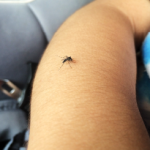“[Although] a high viral load, which may be evidenced by an intense antiviral response, remains to be confirmed as a definite risk factor, population-based studies have shown the aforementioned factors can be used to estimate the degree of severity and duration of chikungunya disease,” Dr. Mahalingam says. Other proposed risk factors, such as female gender and comorbidities, including preexisting rheumatic disease, have not been confirmed.
Complicating the diagnosis for physicians evaluating a patient with chronic symptoms is that “even though anti-CHIKV IgG [immunoglobulin G] antibody levels in the acute phase and the persistence of IgM antibodies appear to be associated with disease activity and harbinger of poor rheumatologic outcome from sparse individual reports, there is no specific biological marker for assessing chronic disease associated with CHIKV infection,” says Dr. Mahalingam.
Dr. Chang and colleagues looked at the frequency of chronic joint pain following CHIKV infection in a prospective cohort of 500 patients in Colombia who were clinically diagnosed during the 2014–2015 epidemic. Their research, also published in Arthritis & Rheumatology in April, is the largest observational study in Latin America to describe the incidence of long-term arthritic symptoms after chikungunya infection.2
The study found that 25% of the 485 patients who had serologically confirmed chikungunya infection had persistent joint pain about 20 months later. They were more likely to have had more severe initial symptoms and to suffer greater joint involvement, including the number of joints involved and a duration of initial joint pain of four weeks or longer. They were more likely to report having missed work or school, and to report their normal activities had been affected by the infection. In this study, development of chikungunya arthritis was not related to older age or female gender.
Recognizing Chronic Chikungunya Arthritis
“Returning travelers from these areas may have fever, rash and joint pain, but they often do not make it to the rheumatologist until they have been suffering with arthritic disease for more than a year,” says Dr. Chang. “It is important that the rheumatologist question the patient about when their symptoms first started and whether the initial symptoms were accompanied by fever, rash and travel to an endemic area.
“I think we are probably missing this diagnosis frequently because we are not used to seeing it. Explosive outbreaks continue in the Americas, with a most recent outbreak occurring in Brazil. This would be a good time to keep track of your Brazilian patients who are coming back with joint pain,” she advises.

